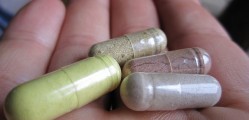
Endocrine disruptors are chemicals that may interfere with the body’s endocrine system and produce adverse developmental, reproductive, neurological, and immune effects in both humans and wildlife. A wide range of substances, both natural and man-made, are thought to cause endocrine disruption, including pharmaceuticals, dioxin and dioxin-like compounds, polychlorinated biphenyls, DDT and other pesticides, and plasticizers such as bisphenol A. Some of the most obvious ones include soaps and antibacterial wipes, but you can also find it in cutting boards, toys, clothing, household furnishings, pet food dispensers, and much more.
Triclosan Removed from Soap, But Still Found in Best-Selling Toothpaste
Three years ago, Colgate-Palmolive responded to safety concerns brought forth by consumer groups by removing triclosan from its soap products. But the company left it in its best-selling toothpaste, Colgate Total. (Colgate Total is the only triclosan-containing toothpaste sold in the US.)
But if triclosan can cause serious health problems when used topically, surely using it in your mouth is not going to be any safer, as chemicals are readily absorbed in your oral cavity.
For example, zinc-containing denture creams like Fixodent, Poligrip, Super Poligrip, and others, have been linked to zinc poisoning. Toxic effects include serious neurological problems, including neuropathy.
There are even class-action lawsuits underway by people who have been poisoned by their denture creams. With regards to triclosan-containing toothpaste, Bloomberg reports:
“Total is safe, Colgate says, citing the rigorous Food and Drug Administration process that led to the toothpaste's 1997 approval as an over-the-counter …
Endocrine experts agreed that endocrine-disrupting chemicals (EDCs) pose a threat to human health and to the ecosystems of Earth. The editorial comes in response to a commentary (Dietrich et al. Chem Biol Interact) signed by a number of editors of toxicology journals that dismisses the state-of-the-science on EDCs and argues for the status quo in the regulation of these hazardous substances.
![]() Please Read this Article at Articles.Mercola.com
Please Read this Article at Articles.Mercola.com





Leave a Reply